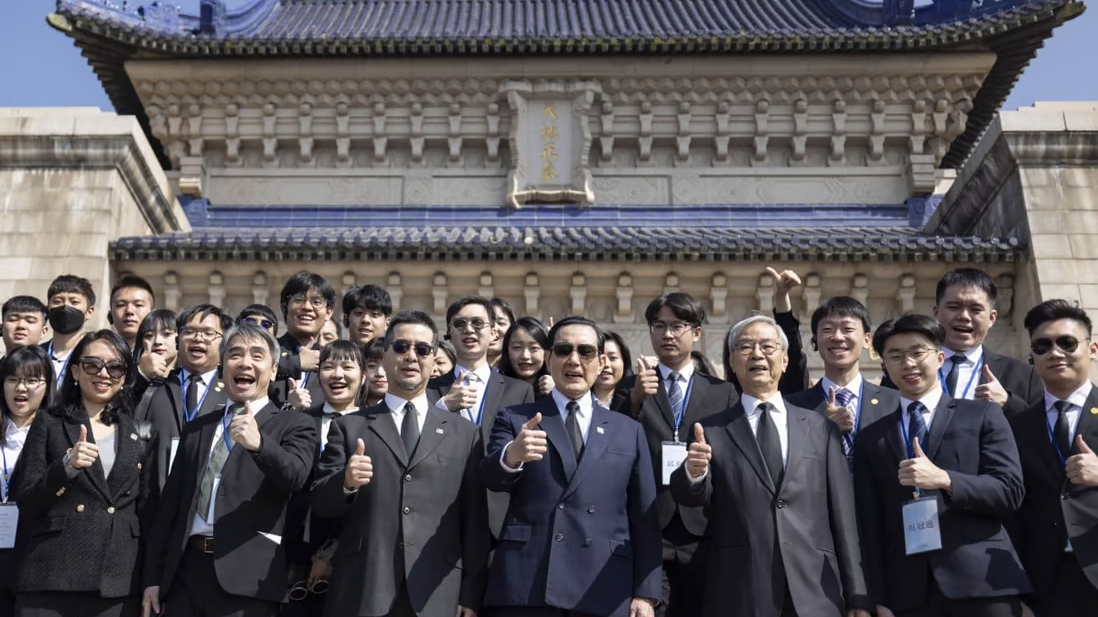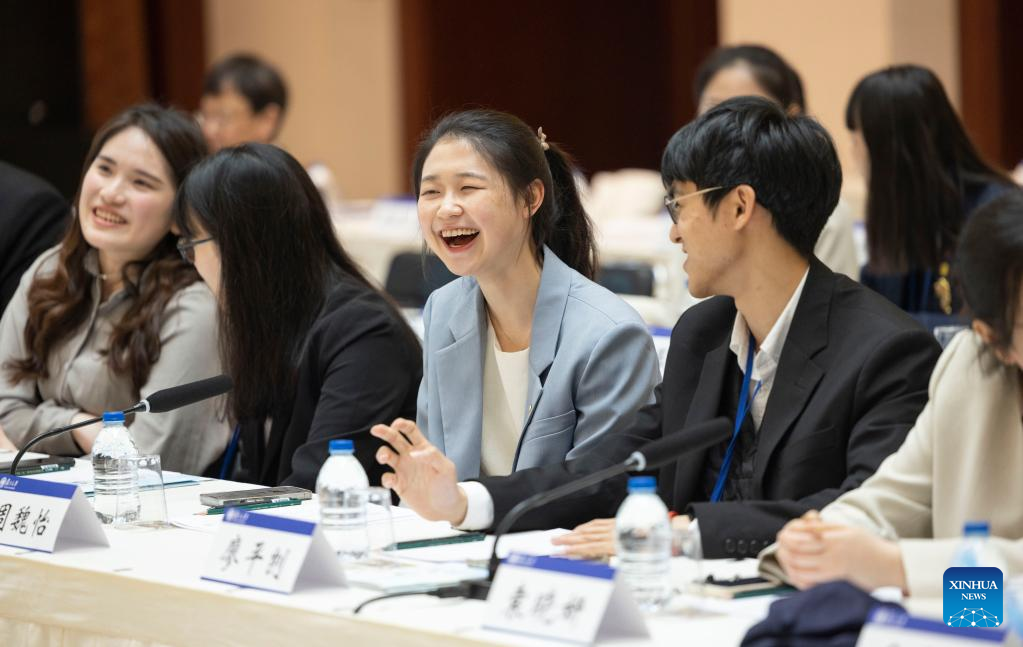
Former chairman of the Chinese Kuomintang party Ma Ying-jeou, center, poses with a delegation at the Sun Yat-sen Mausoleum in Nanjing, east China's Jiangsu Province, March 28, 2023. /Xinhua
Former chairman of the Chinese Kuomintang party Ma Ying-jeou, center, poses with a delegation at the Sun Yat-sen Mausoleum in Nanjing, east China's Jiangsu Province, March 28, 2023. /Xinhua
Editor's note: Zhou Wenxing is an assistant professor at the School of International Studies, Nanjing University. He regularly writes on comparative politics and international relations, with an emphasis on the Taiwan question and China-U.S. relations. The article reflects the author's opinions, and not necessarily the views of CGTN.
A delegation led by Ma Ying-jeou, former chairman of the Chinese Kuomintang party, concluded their visit to the Chinese mainland on April 7. The 12-day trip from March 27 is of great significance. Not only is it aimed at paying tribute to Ma's ancestors but it conveys a critical message that only through dialogues and communications between the two sides of the Taiwan Straits could peace and stability be achieved.
Indeed, this was a long-awaited trip for Ma. He started to handle cross-Straits affairs when he was in his 30s. But he never had a chance to visit the mainland until this year, when he is turning 73 this July. As he said at the Taoyuan Airport before departing for the mainland, "I have waited for 36 years for this chance to visit the mainland."
Ma's first trip to the mainland has become a hot topic these days, drawing great attention from both sides across the Straits and abroad. It is mainly because Ma is the first former Taiwan leader to visit the mainland since the People's Republic of China was established in 1949. It's also because of the three main goals of this trip, which could be summarized with three keywords.
The first keyword is "tracing roots."
To worship and pay respect to ancestors, and thus tracing their origins during China's Qingming Festival, or Tomb-Sweeping Day, is the first goal. On April 1, Ma visited the tomb of his grandfather in Xiangtan County, Hunan Province, to honor the family's ancestors. While greeting villagers in the county, Ma even said, speaking in the local dialect, that "The Xiangtan boy is back!" Born in Hong Kong and growing up in Taiwan, Ma's rare usage of the Hunan dialect showed not only his nostalgia for his hometown but also the unbreakable bond with his ancestors.
Ma's first stop at the Nanjing-based Sun Yat-sen Mausoleum could also be treated as a means to explore roots. If Ma's visit to his grandfather's grave was more about tracing roots for himself and his family, then the delegation's visit to the Sun Mausoleum and tribute to martyrs during the War of Resistance against Japanese Aggression should be deemed as crucial steps to search for origins of the delegation members.
After writing an inscription of "Peace, endeavor, revitalizing China" during the visit to the Sun Mausoleum, Ma called on the younger generation in Taiwan to gain a deep understanding of Sun's life and cross-Straits ties. These remarks are supposed to help young members of the delegation to trace their Chinese roots. Ma also noted that the next generation from both sides of the Straits shall work hard to rejuvenate China.
The second keyword is "exchange."
Among the delegation members, 30 are college students. They talked to their mainland counterparts from the three top universities, namely, Wuhan University, Hunan University, and Fudan University. These were great opportunities for young people across the Straits to have face-to-face communications and hence understand each other. Young delegation members also had the chance to witness the rapid development of the mainland with their own eyes.

Taiwan students and students of Fudan University attend a group discussion at Fudan University in Shanghai, China, April 6, 2023. /Xinhua
Taiwan students and students of Fudan University attend a group discussion at Fudan University in Shanghai, China, April 6, 2023. /Xinhua
Thanks to these exchanges, particularly among the younger generation, the current atmosphere across the Straits could hence be improved. This could, as Ma expected, "bring peace faster, and earlier."
The third keyword is "peace."
Tracing origins and bolstering exchanges are indispensable approaches to reducing conflicts and promoting peace across the Straits. During his mainland visit, Ma reaffirmed the significance of the 1992 Consensus, whose core meaning is that both sides of the Straits belong to one China and will work together towards national reunification. Only by recognizing and maintaining this common political consensus could both sides across the Straits strengthen communications, and achieve peaceful cooperation. This is one of the key reasons Ma could make this trip possible.
This is also the main reason Ma could make significant contributions both to the economic development of the Taiwan region and to the stable cross-Straits ties when he was Taiwan's regional leader from 2008 to 2016. His efforts to accelerate the "three direct links," i.e., direct shipping, direct flights, and direct mail, had ushered in a new era of cooperation across the Straits.
However, just as Ma led a delegation to visit the mainland, Tsai Ing-wen made a sensitive "stopover" in the U.S. to seek the so-called support from Americans regardless of criticism by Chinese people on both sides of the Straits and in the U.S.
In contrast, Ma's visit to the mainland for peace is warmly welcomed, particularly at the current moment when cross-Straits tensions escalate and soured China-U.S. ties intensify. Ma's mainland trip matters for all parties. It provides, at least, an alternative option for people in Taiwan longing for peace and stability in its relationship with the mainland.
(If you want to contribute and have specific expertise, please contact us at opinions@cgtn.com. Follow @thouse_opinions on Twitter to discover the latest commentaries in the CGTN Opinion Section.)